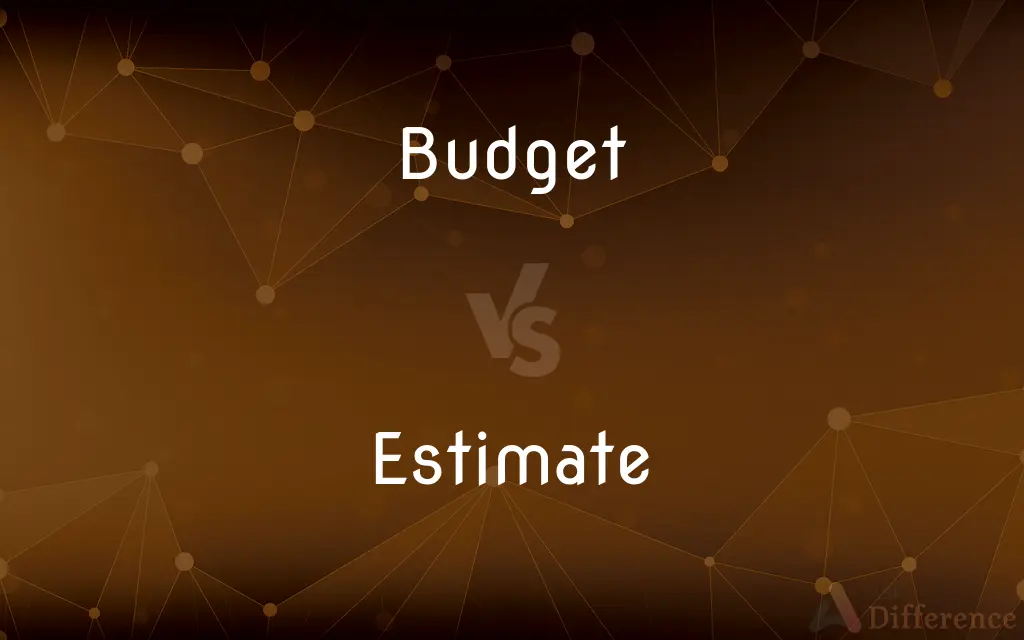Budget vs. Estimate — What's the Difference?
By Maham Liaqat & Fiza Rafique — Updated on April 1, 2024
A budget is a detailed financial plan for the future, outlining expected income and expenses, while an estimate is a rough calculation or judgment of the cost, size, value, or extent of something.

Difference Between Budget and Estimate
Table of Contents
ADVERTISEMENT
Key Differences
Budgets are comprehensive financial tools used by individuals, businesses, and governments to plan and control spending over a specific period. They reflect financial goals and limitations, aiming to manage resources effectively. Estimates, however, are preliminary calculations that provide an approximation of costs or resources needed for a specific project or purchase, often used in the planning phases before detailed budgets are developed.
While a budget is created with the intent of adhering to defined financial boundaries over time, estimates serve as an initial guide, helping to gauge the feasibility or cost of a project. A budget is often based on both historical data and future projections, making it a critical tool for financial management and planning. In contrast, an estimate is typically derived from past experiences, market research, or specific requirements of a project, and is subject to change as more information becomes available.
The process of budgeting is dynamic, requiring adjustments and revisions as actual figures and circumstances deviate from the original plan. Estimates, on the other hand, may be adjusted or refined as project specifics become clearer, but they do not undergo the continuous monitoring and adjustment that budgets do.
In practical terms, a budget encompasses all financial aspects of a plan, including income, expenses, savings, and investments, and serves as a roadmap for financial decision-making. Estimates, while important for initial planning and decision-making, are more narrowly focused and serve to inform the budgeting process by providing early cost projections.
Comparison Chart
Purpose
To plan and control spending over time
To provide a rough calculation of costs
ADVERTISEMENT
Scope
Comprehensive financial planning
Preliminary cost projection
Usage
Financial management and planning
Initial project planning
Basis
Historical data and future projections
Past experiences, market research
Adjustments
Regularly reviewed and adjusted
Refined as more information becomes available
Compare with Definitions
Budget
A detailed financial plan outlining expected income and expenses.
The company's annual budget was set to maximize profits while controlling costs.
Estimate
A rough calculation of the cost, size, value, or extent of something.
The contractor provided an estimate for the home renovation project.
Budget
Reflects financial goals and limitations.
Their household budget included savings for emergency funds and vacations.
Estimate
Derived from similar past projects or market research.
The estimate for the new building was based on recent construction projects in the area.
Budget
Requires adjustments based on actual income and expenses.
Mid-year, they adjusted the budget due to unexpected expenditures.
Estimate
Helps gauge the feasibility or cost of projects.
The estimate indicated that the project was within the client's budget.
Budget
Guides spending and investment decisions.
The budget acted as a roadmap for financial decision-making throughout the year.
Estimate
May be adjusted as more information becomes available.
The initial estimate was revised after discovering additional repair needs.
Budget
Used to manage resources effectively.
The budget was a crucial tool for managing the project's limited resources.
Estimate
Provides early cost projections to inform budgeting.
The project's budget was developed using estimates from various contractors.
Budget
A budget is a financial plan for a defined period, often one year. It may also include planned sales volumes and revenues, resource quantities, costs and expenses, assets, liabilities and cash flows.
Estimate
To calculate approximately (the amount, extent, magnitude, position, or value of something).
Budget
An itemized summary of estimated or intended expenditures for a given period along with proposals for financing them
Submitted the annual budget to Congress.
Estimate
To form an opinion about; evaluate
"While an author is yet living we estimate his powers by his worst performance" (Samuel Johnson).
Budget
A systematic plan for the expenditure of a usually fixed resource, such as money or time, during a given period
A new car will not be part of our budget this year.
Estimate
A tentative evaluation or rough calculation, as of worth, quantity, or size
An estimate of the damage caused by the storm.
Budget
The total sum of money allocated for a particular purpose or period of time
A project with an annual budget of five million dollars.
Estimate
A statement of the approximate cost of work to be done, such as a building project or car repairs.
Budget
A stock or collection with definite limits
"his budget of general knowledge" (William Hazlitt).
Estimate
A judgment based on one's impressions; an opinion
I have a high estimate of his character.
Budget
Appalachian Mountains A wallet or small pouch.
Estimate
A rough calculation or assessment of the value, size, or cost of something.
Budget
To plan in advance the expenditure of
Needed help budgeting our income.
Budgeted my time wisely.
Estimate
(construction and business) A document (or verbal notification) specifying how much a job is likely to cost.
Budget
To enter or account for in a budget
Forgot to budget the car payments.
Estimate
An upper limitation on some positive quantity.
Budget
To make or use a budget.
Estimate
To calculate roughly, often from imperfect data.
Budget
Of or relating to a budget
Budget items approved by Congress.
Estimate
To judge and form an opinion of the value of, from imperfect data.
Budget
Appropriate for a restricted budget; inexpensive
A budget car.
Budget meals.
Estimate
To judge and form an opinion of the value of, from imperfect data, - either the extrinsic (money), or intrinsic (moral), value; to fix the worth of roughly or in a general way; as, to estimate the value of goods or land; to estimate the worth or talents of a person.
It is by the weight of silver, and not the name of the piece, that men estimate commodities and exchange them.
It is always very difficult to estimate the age in which you are living.
Budget
The amount of money or resources earmarked for a particular institution, activity or timeframe.
Limited budget
Unlimited budget
Tight budget
Within the budget
Over the budget
Estimate
To from an opinion of, as to amount,, number, etc., from imperfect data, comparison, or experience; to make an estimate of; to calculate roughly; to rate; as, to estimate the cost of a trip, the number of feet in a piece of land.
Budget
(by implication) A relatively small amount of available money.
We're on a budget, so we can't afford to eat at that restaurant.
Estimate
A valuing or rating by the mind, without actually measuring, weighing, or the like; rough or approximate calculation; as, an estimate of the cost of a building, or of the quantity of water in a pond.
Weigh success in a moral balance, and our whole estimate is changed.
No; dear as freedom is, and in my heart'sJust estimation prized above all price.
Budget
An itemized summary of intended expenditure; usually coupled with expected revenue.
Estimate
An approximate calculation of quantity or degree or worth;
An estimate of what it would cost
A rough idea how long it would take
Budget
(obsolete) A wallet, purse or bag.
Estimate
A judgment of the qualities of something or somebody;
Many factors are involved in any estimate of human life
In my estimation the boy is innocent
Budget
(obsolete) A compact collection of things.
Estimate
A document appraising the value of something (as for insurance or taxation)
Budget
A socket in which the end of a cavalry carbine rests.
Estimate
A statement indicating the likely cost of some job;
He got an estimate from the car repair shop
Budget
Appropriate to a restricted budget.
We flew on a budget airline.
Estimate
The respect with which a person is held;
They had a high estimation of his ability
Budget
(intransitive) To construct or draw up a budget.
Budgeting is even harder in times of recession
Estimate
Judge tentatively or form an estimate of (quantities or time);
I estimate this chicken to weigh three pounds
Budget
(transitive) To provide funds, allow for in a budget.
The PM’s pet projects are budgeted rather generously
Estimate
Judge to be probable
Budget
(transitive) To plan for the use of in a budget.
The prestigious building project is budgeted in great detail, from warf facilities to the protocollary opening.
Budget
A bag or sack with its contents; hence, a stock or store; an accumulation; as, a budget of inventions.
Budget
The annual financial statement which the British chancellor of the exchequer makes in the House of Commons. It comprehends a general view of the finances of the country, with the proposed plan of taxation for the ensuing year. The term is sometimes applied to a similar statement in other countries.
Budget
A sum of money allocated for a particular purpose;
The laboratory runs on a budget of a million a year
Budget
A summary of intended expenditures along with proposals for how to meet them;
The president submitted the annual budget to Congress
Budget
Make a budget
Common Curiosities
How often should a budget be reviewed?
A budget should be reviewed regularly, often monthly or quarterly, to adjust for any discrepancies between planned and actual figures and to reflect any changes in financial circumstances.
Why is a budget important?
A budget is important because it provides a structured plan for managing income, expenses, and financial goals, ensuring financial stability and growth.
Why might an estimate change?
An estimate might change due to unforeseen factors, additional requirements, market fluctuations, or more detailed information becoming available.
How can technology improve budgeting and estimating processes?
Technology can improve these processes through automated tools and software that provide more accurate data analysis, forecasting, and real-time adjustments.
How accurate are estimates?
Estimates can vary in accuracy and are intended to provide a preliminary overview of costs; they become more accurate as more details about a project are known.
What happens if a project exceeds its estimated costs?
If a project exceeds its estimated costs, it may require reevaluation, additional funding, or scope adjustments to align with the available budget.
Is an estimate legally binding?
Generally, estimates are not legally binding, but some contracts may specify conditions under which an estimate must be reasonably accurate.
Can personal finances benefit from budgeting and estimating?
Yes, personal finances can significantly benefit from both budgeting and estimating by providing a framework for managing spending, saving, and investing effectively.
How does a fixed budget compare to a flexible budget?
A fixed budget does not change once set, regardless of changes in income or expenses, whereas a flexible budget adjusts according to actual revenue and expenditure levels.
What role do estimates play in business?
In business, estimates play a crucial role in project planning, helping to determine whether a project is financially feasible and how it should be budgeted.
What impact do market conditions have on estimates?
Market conditions can significantly impact estimates, as changes in material costs, labor rates, and economic factors can alter the cost projections.
Can a budget exist without estimates?
While it's possible to create a budget without specific estimates, having accurate estimates can significantly enhance the budget's reliability, especially for projects or new ventures.
What is zero-based budgeting?
Zero-based budgeting is a method where each new budget starts from zero, and every expense must be justified, as opposed to basing it on previous budgets.
How do estimates affect stakeholder expectations?
Estimates can set stakeholder expectations regarding the cost and timeline of a project; accurate estimates help manage these expectations and reduce the risk of disappointment.
Why is contingency important in budgeting and estimating?
Contingency is important as it provides a buffer for unexpected costs or changes, ensuring that a project or budget can adapt to unforeseen circumstances.
Share Your Discovery

Previous Comparison
Entertainment vs. Entertain
Next Comparison
Amygdalin vs. AmygdalaAuthor Spotlight
Written by
Maham LiaqatCo-written by
Fiza RafiqueFiza Rafique is a skilled content writer at AskDifference.com, where she meticulously refines and enhances written pieces. Drawing from her vast editorial expertise, Fiza ensures clarity, accuracy, and precision in every article. Passionate about language, she continually seeks to elevate the quality of content for readers worldwide.















































